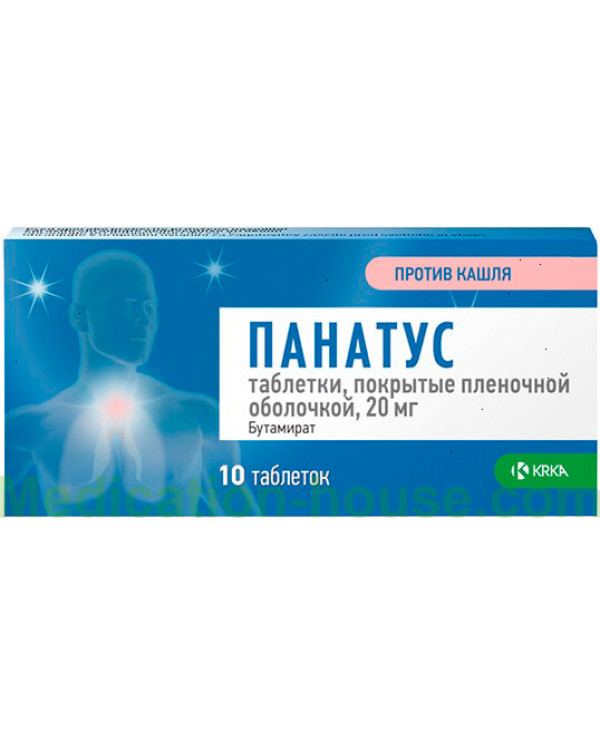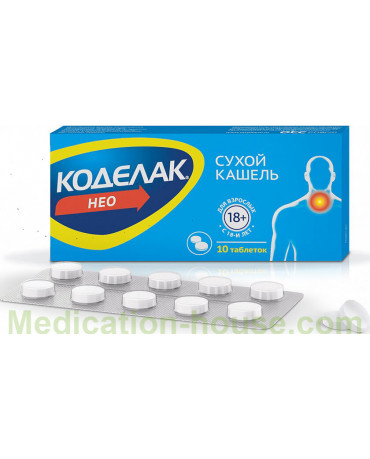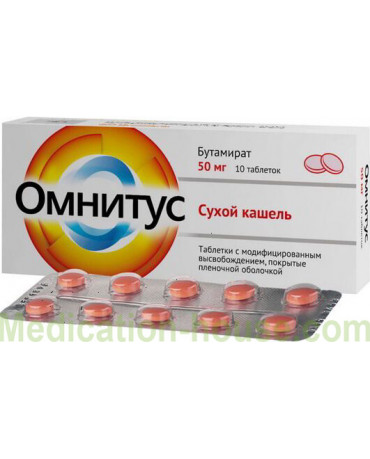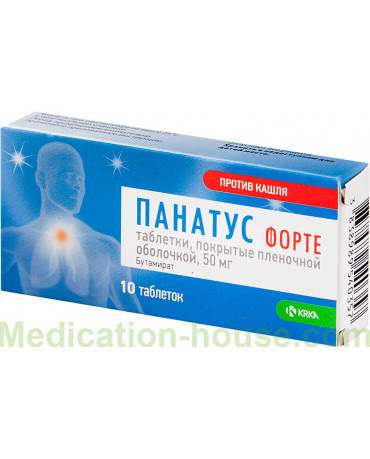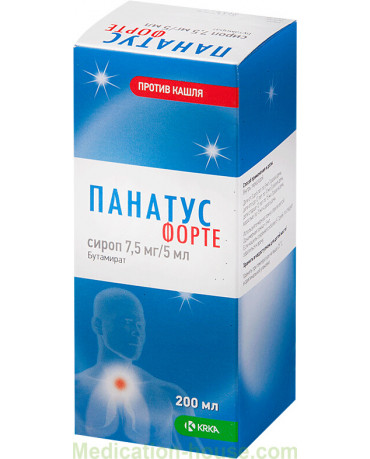Instruction for Panatus
Reed more and buy Panatus on this page
Panatus is an antitussive agent of central action.
Release form and composition
film-coated tablets: round, biconvex, tan, beveled; a rough mass covered with a yellow-brown shell is visible at the kink (10 pcs in a blister, 1 blister in a cardboard bundle);
Each pack also contains instructions for the use of Panatus.
Composition of 1 film-coated tablet:
active substance: butamirate citrate - 20 mg;
auxiliary components: hypromellose K15M Premium, colloidal silicon dioxide, povidone K-25, magnesium stearate, lactose monohydrate, talc, quinoline yellow dye (E104);
film coat: propylene glycol, talc, titanium dioxide (E171), hypromellose 6 mPas, dyes iron oxide yellow (E172) and iron oxide red (E172).
Pharmacodynamics
The active ingredient of Panatus is butamirate - a centrally acting antitussive that is neither pharmacologically nor chemically related to opium alkaloids.
The drug has a direct effect on the cough center, so it suppresses cough. It has a bronchodilating effect. Improves blood oxygenation and spirometry (reduces airway resistance), which helps to facilitate breathing.
Pharmacokinetics
After oral administration, butamirate is rapidly and completely absorbed.
With repeated applications, the plasma concentration of the substance remains linear. Cumulation is not observed.
The onset of hydrolysis of butamirate occurs in the blood, resulting in the formation of 2-phenylbutyric acid and diethylaminoethoxyethanol - metabolites that also have antitussive activity.
Butamirate and its metabolites are approximately 95% bound to plasma proteins, which explains their long half-life and long therapeutic effect.
The half-life is 6 hours. Metabolites are excreted mainly by the kidneys, while metabolites with an acid reaction are significantly associated with glucuronic acid.
Indications for use
Panatus is used to relieve dry cough of any etiology, including pertussis, bronchoscopy, surgical interventions, as well as in the pre- and postoperative periods.
Contraindications
Absolute:
lactose intolerance, lactase deficiency and glucose-galactose malabsorption syndrome - for tablets, fructose intolerance - for syrup;
I trimester of pregnancy;
lactation period;
children under 6 years old - for tablets, up to 3 years - for syrup;
hypersensitivity to any component of the drug.
With caution, Panatus should be used in the II – III trimesters of pregnancy.
Instructions for use: method and dosage
Panatus tablets and syrup are intended for oral use. Take the drug before meals.
Recommended dosage regimens for tablets depending on age:
6-12 years - 1 pc. 2 times a day;
12-18 years - 1 pc. 3 times a day;
from 18 years - 2 pcs. 2-3 times a day.
If after 5-7 days of treatment the cough persists, it is necessary to consult a doctor.
Side effects
Panatus is generally well tolerated.
In rare cases (from ≥ 1/10 000 to <1/1000), the following side effects are noted:
from the digestive system: diarrhea, nausea, vomiting;
from the central nervous system: dizziness, drowsiness;
on the part of the skin: exanthema;
others: allergic reactions.
Overdose
Symptoms: abdominal pain, nausea, diarrhea, vomiting, impaired coordination of movements, dizziness, irritability, drowsiness, decreased blood pressure.
Treatment: gastric lavage, intake of activated charcoal and laxatives, symptomatic therapy, maintenance of the functions of the respiratory and cardiovascular systems. The antidote is unknown.
special instructions
Each Panatus tablet contains 0.314 9 g of lactose.
5 ml of syrup (1 scoop) contains 1.75 g of sorbitol.
Influence on the ability to drive vehicles and complex mechanisms
Butamirate in some patients causes drowsiness, therefore, during the treatment period, caution should be exercised by drivers of vehicles and persons employed in potentially hazardous industries who require increased attention and speed of psychomotor reactions to work.
Pregnancy and lactation
There is no information on the safety of butamirate during pregnancy. Whether the drug crosses the placental barrier is unknown. In this regard, in the first trimester Panatus is contraindicated, in the second and third trimesters it can be used only as directed by a doctor.
It has not been established whether butamirate with breast milk is excreted, so it is not recommended to take Panatus during lactation.
Use in childhood
Panatus tablets are contraindicated in children under 6 years old, syrup - up to 3 years.
Drug interaction
Information on possible drug interactions with butamirate is not provided by the manufacturer.
The drug suppresses the cough reflex, therefore Panatus should not be used simultaneously with expectorants, since in this case accumulation of sputum in the respiratory tract is possible.
During therapy, it is not recommended to take drugs that inhibit the central nervous system (including sleeping pills, tranquilizers and antipsychotics), as well as ethanol.
Terms and conditions of storage
Store in the original packaging out of the reach of children at temperatures up to 25 ° C.
The shelf life of the tablets is 5 years.
Reviews
According to reviews, Panatus is an effective antitussive that helps with dry cough of various etiologies, does not cause side effects and is relatively inexpensive.
Terms of sell
You don't need a prescription to buy Panatus.

